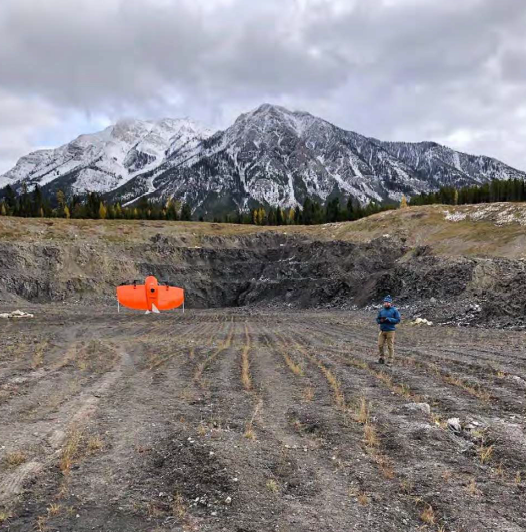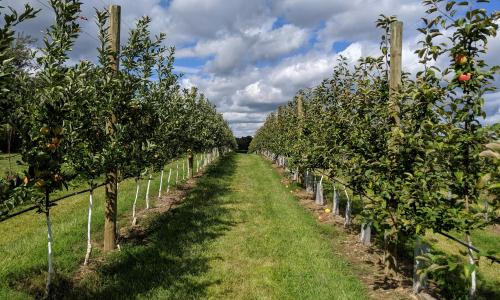An enriched soil leads to the growth of healthy plants and the cultivation of high yielding crops. A sustainable ecosystem thrives on soil health. One product that is beneficial is Gypsum. Sustainably mined in South-Eastern British Columbia, FOUR J Gypsum powder is approved for use in organic farming.

Gypsum is a mineral known for its positive effects on soil health, containing plant-available calcium and sulfur, both essential nutrients for plants and soil microbes.
Benefits of Calcium for Plants and Soil:
1. Vital component of plant cell walls, providing vigor and rigidity. It helps plants withstand environmental stresses and diseases, promoting overall plant health and resilience.
2. Adequate calcium levels in the soil enhance nutrient uptake by plant roots ensuring optimal plant nutrition.
3. Activates enzymes involved in plant growth and development, including those responsible for protein synthesis, hormone regulation, and energy metabolism.
4. Helps plants fend off diseases by enhancing the plant's ability to form physical barriers against pathogens, reducing the risk of infections and improving overall disease resistance.
5. Plays a role in regulating soil pH levels. It can help neutralize soil acidity, creating a more favorable environment for nutrient availability and uptake.
Benefits of Sulfur for Plants and Soil:
1. Important for protein synthesis, which is necessary for plant growth, development, and the production of enzymes, hormones, and structural components.
2. Aids in the production of chlorophyll, the green pigment responsible for photosynthesis. Sufficient sulfur levels ensure optimal photosynthetic activity, leading to healthy plant growth and vigor.
3. Improves nutrient use efficiency to maximize the effectiveness of fertilizers. It aids in the uptake and conversion of other essential nutrients into usable forms, such as nitrogen, phosphorus, and potassium.
4. Enhances stress tolerance in plants by withstanding adverse environmental conditions, including drought, high salinity, and temperature extremes. Sulfur also plays a role in enhancing plant resistance to pests and diseases.
The high-quality gypsum found in FOUR J Gypsum, with an average purity of over 85%, makes it a valuable resource for enhancing soil fertility.
Unique Properties of Gypsum
Unlike elemental sulfur, which is used to reduce the pH of alkaline soils, gypsum does not alter soil pH despite containing sulfur. The sulfur in gypsum is in a soluble sulfate form, readily available to plants and soil microbes. Gypsum is soluble and fast-acting, moving into the soil more quickly than limestone after surface application.
The benefits of gypsum extend beyond nutrient availability. Gypsum significantly improves water infiltration in soils, reducing runoff and erosion potential. This natural amendment also helps prevent soil compaction, which can impede seed emergence and seedling establishment. In clay soils, gypsum plays a crucial role in promoting stable soil aggregates, enhancing soil structure, and ensuring optimal air and water content for plant roots and soil microbes. With improved soil structure, plants and beneficial organisms can thrive, leading to healthier and more productive crops.
Applying FOUR J Gypsum
It can be surface-applied or tilled into the soil, and used throughout the growing season, from spring to fall. Gypsum can be used for general lawn maintenance to establish healthy lawns, in vegetable, herb, and flower gardens, for shrubs and trees, container plants, and broad acre crops.
Physical Characteristics
Gypsum typically appears white to greyish white, with a hardness of about 2.0 and a specific gravity of 2.2. Gypsite deposits typically occur in semi-arid and arid climates, formed by the solution of existing gypsum deposits by groundwater, which then evaporates at the surface, leaving a porous aggregate of gypsum. The degree of hydration plays a crucial role in evaluating the economic potential of a gypsum deposit. FOUR J Gypsum contains 32.6% CaO (calcium oxide), 46.5% SO3 (sulfur trioxide), and 20.9% H2O (water).
Guaranteed Analysis
Calcium Sulfate Dihydrate (CaSO4 2H2O) - 88%
Calcium (Ca) - 22%
Sulfur (S) - 16%
FOUR J Gypsum is naturally sourced. Its high quality, combined with the numerous benefits gypsum offers, makes it an excellent choice for enhancing soil structure, improving water infiltration, and providing essential nutrients to plants and soil microbes. By incorporating FOUR J Gypsum into your farming practices, you can create the optimal conditions for robust plant growth and cultivate a healthy, sustainable ecosystem.
For more information on FOUR J Gypsum, contact Jo Shearer by email jo@homegoldresourcesltd.com.


